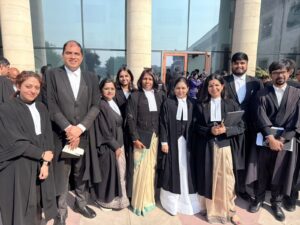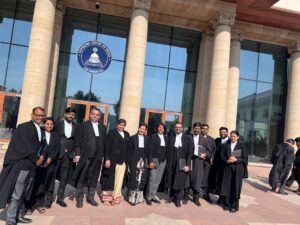In a series of orders, the Supreme Court, in the case of Deeksha N. Amrutesh v. State of Karnataka and Ors [SLP (C) 1404/2025] along with Karnataka Federation of Women Lawyers v. State of Karnataka [SLP (C) 3031/2025] and Kavitha H.C. v. State of Karnataka [SLP (C) 3283/2025], gave a significant victory to the women lawyers of Bengaluru. The Supreme Court, invoking its powers under Article 142 of the Constitution, directed the Advocates’ Association, Bengaluru (AAB) to reserve the Treasurer post exclusively for women candidates in its upcoming elections and mandated that 30% of the Governing Council seats be reserved for women. The elections must also be completed within three weeks.
This marks a turning point in the fight for gender equality and women’s leadership within the legal profession. For years, the AAB—the bar association for the Karnataka High Court and Bangalore District Courts—has been dominated by men. During the 2021-2024 term, for example, only 2 out of 29 Governing Council members were women, and no woman has ever been elected as an office-bearer. This glaring lack of representation reflects the systemic barriers women face in bar elections, from limited resources for campaigning, to deep-rooted biases against women.
The orders are the result of persistent litigation by concerned women lawyers before the Karnataka High Court seeking the inclusion of women members in the Governing Council of the AAB. The Petitioners before the Karnataka High Court included the Karnataka Federation of Women Lawyers (KFWL), and women advocates Deeksha Amrutesh and Kavita H.C. The Petitioners had filed writ petitions seeking reservations for women in the AAB, in line with the Supreme Court’s directives in previous cases Supreme Court Bar Association v. B.D. Kaushik and Fozia Rahman v. Bar Council of Delhi and Another be provided. These orders emphasized the need for gender-based reservations in Bar associations in the country.

In the writ petition before the High Court, three women senior counsels represented the Petitioners. Senior Advocate Jayna Kothari, appearing for the KWFL, argued that the High Court should issue similar directions to the AAB based on the Supreme Court’s previous rulings. However on January 8, 2025, the Single Judge, Hon’ble Justice R. Devdas, declined to interfere with the electoral process, stating that it was not within the High Court’s powers to amend the rules of the AAB. The Court granted liberty to the Petitioners to approach the Supreme Court for directions under Article 142.
The Petitioners thereafter filed Special Leave Petitions before the Supreme Court, challenging the High Court order. They argued that the Court failed to appreciate that gender-based reservations for Governing Council posts fulfill Articles 15(3) and (4) of the Constitution, which enable special provisions for women to address structural disadvantages. They also contended that the AAB’s non-compliance with the Supreme Court’s directives in B.D. Kaushik and Fozia Rahman amounted to gender discrimination, violating Articles 14 and 15, and interfered with women’s right to practice their profession under Article 19(1)(g).
In its January 24 order, the Supreme Court reasoned that since there was no provision under the AAB rules barring reservations for women, there was no legal impediment to passing an order for adequate representation of women under its Article 142 powers.

It is significant to note that the AAB did not appear at the hearing on January 24, despite being given notice. However, AAB and several male advocates moved the matter again, seeking additional posts in the Governing Council. This prompted the hearing on January 28, where the Court held once again that the Treasurer post would be exclusively for women, but directed the creation of an additional post of Vice-President and an increase in the number of posts to the Governing Council. The Court reiterated that even with the increase in posts, 30% of the total posts were reserved for women.
Women lawyers face unique challenges, including balancing domestic responsibilities, navigating gender-insensitive workplaces, and dealing with a lack of grievance mechanisms. By ensuring women have a voice in leadership, bar associations can better address these issues and create a more inclusive environment in the courts. Moreover, seeing women in leadership roles inspires others to step up, fostering a cycle of empowerment. Ultimately, increasing the representation of women in the leadership of Bar associations helps create a more just, inclusive, and equitable legal profession.
With these orders, it is clear that bar associations across India must take meaningful steps to include women in their governing structure and leadership. They go beyond merely giving women a seat at the table; they empower women lawyers to drive real change in the institution and the legal profession.

